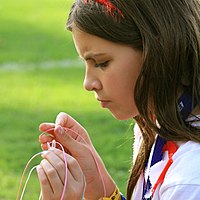
Photo from wikipedia
Efficient selective attention is critical for engaging in task-oriented behavior but may also limit our processing of potentially meaningful, task-irrelevant details. Both older adults and younger children demonstrate poor selective… Click to show full abstract
Efficient selective attention is critical for engaging in task-oriented behavior but may also limit our processing of potentially meaningful, task-irrelevant details. Both older adults and younger children demonstrate poor selective attention skills but show increased processing of task-irrelevant information. This broader attention to non-targets can benefit learning among older adults when the non-target information is relevant to a primary learning goal. Although young children show similar patterns of attention to non-targets, it is unknown whether relevant non-targets similarly benefit their learning. This study examined the relationship between 4- to 8-year-old children's selective attention skills and their learning from incidental exposure to relevant non-targets. In Experiment 1, children completed an incidental encoding phase, followed by a visual search task and then a final recognition memory task. During the search task, participants identified a target within arrays containing 0, 5, 10, or 15 non-targets. Half of the images from the encoding phase appeared in the search as "relevant" non-targets, whereas the remainder never appeared during the search task. Participants showed better memory for images presented as relevant non-targets. However, children showed the largest memory benefit when efficient selective attention allowed for increased scanning of the relevant non-targets after target detection. Experiment 2 confirmed that children showed similarly efficient selective attention skills but no longer showed enhanced learning when they could not scan relevant non-targets following target detection. These results suggest that children's incidental learning from relevant non-targets is an active process that depends on how children use selective attention to engage in effective information gathering.
Journal Title: Journal of experimental child psychology
Year Published: 2020
Link to full text (if available)
Share on Social Media: Sign Up to like & get
recommendations!